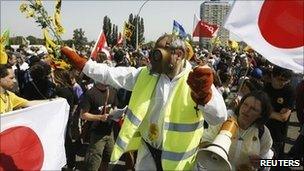Chernobyl nuclear disaster: Ukraine marks anniversary
- Published
A vigil was held in the town of Slavutych, where former Chernobyl workers live
Ukraine is marking the 25th anniversary of the world's worst nuclear accident - at the Chernobyl power plant.
An explosion at one of the plant's reactors sent a plume of radiation across Europe in 1986, harming or killing possibly thousands of people.
Ukrainian President Viktor Yanukovych and his Russian counterpart, Dmitry Medvedev, are visiting the site for a memorial ceremony.
The anniversary comes amid renewed global protest over nuclear power.
The debate has been reinvigorated by the threat of radiation from Japan's crippled Fukushima plant in the aftermath of a devastating earthquake and tsunami.
New shield
Early on Tuesday, Mr Yanukovych attended a candle-lighting service led by Russian Orthodox Patriarch Kirill in the Ukrainian capital, Kiev.
"The world had not known a catastrophe in peaceful times that could compare to what happened in Chernobyl," Patriarch Kirill said.
A bell sounded at 0123 (2223 GMT Monday), the time of the blast, and tolled 25 times.
It was on 26 April 1986 that Number Four reactor at Chernobyl, which was then in the Soviet Union, exploded.
The accident forced the evacuation of hundreds of thousands of people from their homes in Ukraine, western Russia and Belarus.
Soviet officials held off reporting the accident for several days.
There is still a 30km (19-mile) exclusion zone around the plant.
Soviet engineers encased the damaged reactor in a temporary concrete casing to limit the radiation but a new shield is needed.
A donors conference in Kiev, Ukraine, last week raised 550m euros (£486m; $798m) of the 740m euros needed to build a new shelter and a storage facility for spent fuel.
'Tell the truth'

Protesters on Monday demanded France and Germany shut nuclear power stations
The Chernobyl anniversary comes less than two months after the Fukushima nuclear plant in Japan was badly damaged by an earthquake and tsunami, renewing concerns about the safety of nuclear power generation.
The operators of the Fukushima plant, Tokyo Electric Power Co, have also come under fire for not quickly disclosing information on radiation leaks from the plant.
Mr Medvedev said there must be greater transparency in nuclear emergencies.
"I think that our modern states must see the main lesson of what happened at Chernobyl and the most recent Japanese tragedy as the necessity to tell people the truth," he told survivors of the clean-up effort at a meeting in the Kremlin.
On Monday, thousands of people in France and Germany staged protests calling for an end to nuclear power.
Marches were held on several river bridges between France and Germany over the Rhine while there were further protests at German nuclear plants.
Meanwhile in India, security has been tightened around Jaitapur, where protesters are planning to march on the site of a planned six-reactor nuclear power plant.
- Published12 September 2011
- Published21 July 2011
- Published23 March 2011
- Published18 March 2011
- Published19 April 2011
- Published12 March 2011
- Published28 September 2010